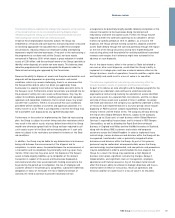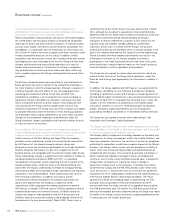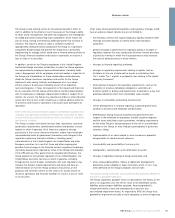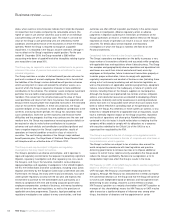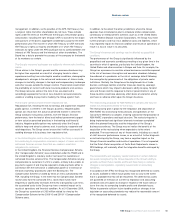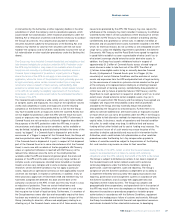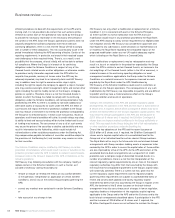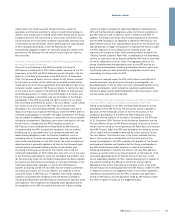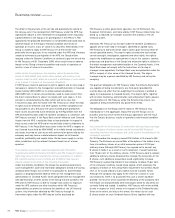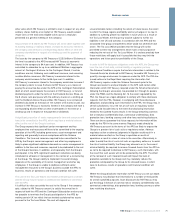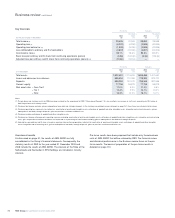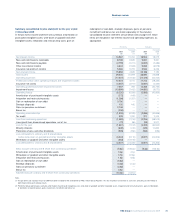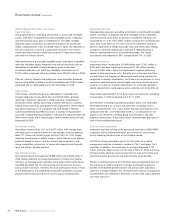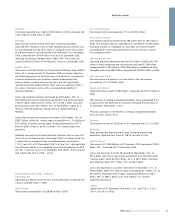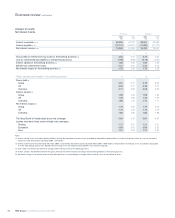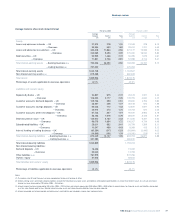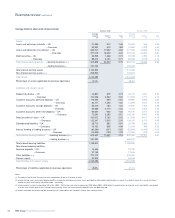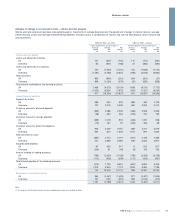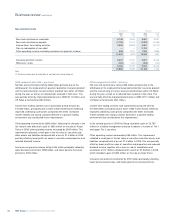RBS 2009 Annual Report Download - page 73
Download and view the complete annual report
Please find page 73 of the 2009 RBS annual report below. You can navigate through the pages in the report by either clicking on the pages listed below, or by using the keyword search tool below to find specific information within the annual report.
71RBS Group Annual Report and Accounts 2009
Business review
other votes which HM Treasury is entitled to cast in respect of any other
ordinary shares held by or on behalf of HM Treasury, would exceed
75 per cent. of the total votes eligible to be cast on a resolution
presented at a general meeting of the company.
Any purchase of B shares by HM Treasury will, when taken together with
its existing holding of ordinary shares, increase its economic interest in
the company and will have a corresponding dilutive effect on other the
company shareholders in respect of a winding up and the payment of
dividends.
The issue by the company to HM Treasury of £25.5 billion of B shares at
the time it acceded to the APS increased HM Treasury’s economic
interest in the company to 84.4 per cent. In addition, HM Treasury has
committed to subscribe for up to an additional £8 billion in aggregate
amount of Contingent B shares for the Contingent Period, if certain
conditions are met. Following such additional issuance, and assuming
no other dilutive issuances, HM Treasury’s economic interest in the
company would increase further to 86.4 per cent. In addition,
HM Treasury’s economic interest in the company would also increase if
the company elects to issue B shares to HM Treasury as a means of
paying the annual fee due under the APS or the Contingent Subscription
(both of which would require the consent of HM Treasury), or to fund
dividend payments under the terms of the Dividend Access Share. As
the B shares rank pari passu with the ordinary shares on a winding-up
and the Dividend Access Share entitles HM Treasury to an enhanced
dividend calculated on the basis of the number of B shares issued, any
increase in HM Treasury’s economic interest in the company will have a
corresponding dilutive effect on other shareholders in the event of a
winding-up and in respect of the payment of dividends.
A significant proportion of senior management’s time and resources will
have to be committed to the APS, which may have a material adverse
effect on the rest of the Group’s business.
The Group expects that significant senior management and key
employee time and resources will have to be committed to the ongoing
operation of the APS, including governance, asset management and
reporting and generally to ensure compliance with the Scheme
Conditions. The time and resources required to be committed to the
APS by the Group’s senior management and other key employees is
likely to place significant additional demands on senior management in
addition to the time and resources required to be dedicated to the rest
of the Group’s business. In addition, and separately from the Group’s
participation in the APS, significant headcount reductions are being
introduced at all levels of management in the context of a restructuring
of the Group. The Group’s ability to implement its overall strategy
depends on the availability of its senior management and other key
employees. If the Group is unable to dedicate sufficient senior
management resources to the Group’s business outside the APS, its
business, results of operations and financial condition will suffer.
The cost of the Tax Loss Waiver and related undertakings is uncertain
and the Group may be subject to additional tax liabilities in connection
with the APS.
It is difficult to value accurately the cost to the Group if the company
opts, subject to HM Treasury consent, to satisfy the annual fee in
respect of both the APS and the Contingent Subscription and any exit
fee (payable to terminate the Group’s participation in the APS) by
waiving certain UK tax reliefs that are treated as deferred tax assets
pursuant to the Tax Loss Waiver. The cost will depend on
unascertainable factors including the extent of future losses, the extent
to which the Group regains profitability and any changes in tax law. In
addition to suffering greater tax liabilities in future years as a result of
the Tax Loss Waiver, the Group may also be subject to further tax
liabilities in the UK and overseas in connection with the APS and the
associated intra-group arrangements which would not otherwise have
arisen. The Tax Loss Waiver provides that the Group will not be
permitted to enter into arrangements which have a main purpose of
reducing the net cost of the Tax Loss Waiver. It is unclear precisely how
these restrictions will apply, but it is possible that they may limit the
operations and future post-tax profitability of the Group.
In order to fulfil its disclosure obligations under the APS, the Group may
incur the risk of civil suits, criminal liability or regulatory actions.
The Scheme Conditions require that certain information in relation to the
Covered Assets be disclosed to HM Treasury to enable HM Treasury to
quantify, manage and assess its exposure under the APS. The FSA has
issued notices to the Royal Bank requiring the information that
HM Treasury requires under the Scheme Documents prior to the
Group’s accession to and participation in the APS (and certain other
information which HM Treasury required under the Scheme Documents
following the Group’s accession), be provided to it through its powers
under the FSMA and the Banking Act. To the extent regulated by the
FSA, the Group has a legal obligation to comply with these disclosure
requests from the FSA. However, in complying with these disclosure
obligations and providing such information to the FSA, the Group may, in
certain jurisdictions, incur the risk of civil suits or regulatory action
(which could include fines) to the extent that disclosing information
related to the Covered Assets results in the Group breaching common
law or statutory confidentiality laws, contractual undertakings, data
protection laws, banking secrecy and other laws restricting disclosure.
There can be no guarantee that future requests for information will be
made by the FSA in the same manner. Requests made directly by
HM Treasury pursuant to the terms of the APS are likely to expose the
Group to a greater risk of such suits or regulatory action. Adverse
regulatory action or adverse judgments in litigation could result in a
material adverse effect on the Group’s reputation or results of
operations or result in a loss of value in the securities. Alternatively, in
order to avoid the risk of such civil suits or regulatory actions or to avoid
the risk of criminal liability, the Group may choose to or (in the case of
criminal liability) be required to remove Covered Assets from the APS so
as not to be required to disclose to HM Treasury, such information, with
the result that such assets will not be protected by the APS. The effect
of the removal of such Covered Assets will impact the level of
protection available to the Group and may materially reduce the
protection anticipated by the Group for its stressed losses, in which
case its business, results of operations and financial condition will
suffer.
Where the Group discloses information to HM Treasury as set out above,
HM Treasury may disclose that information to a number of third parties
for certain specified purposes. Such disclosures by HM Treasury may
put the Group in breach of common law or statutory confidentiality laws,
contractual undertakings, data protection laws, banking secrecy or other
laws restricting disclosure.


